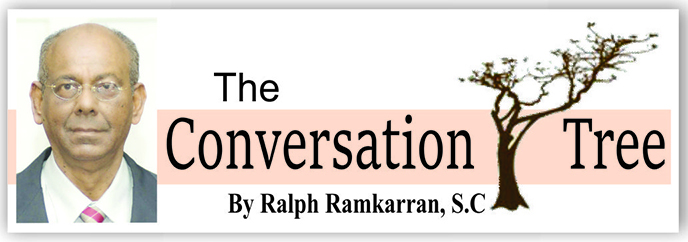The headline is not an original formulation. It is partially borrowed from the late Miles Fitzpatrick, then a columnist in the Stabroek News. He was writing just before the reforms of the early 1990s about the Elections Commission and its Chair, Sir Harold Bollers, a former Chief Justice of Guyana, in an article entitled “The Gumbie Cat.” The struggle for free and fair elections had moved beyond the confines of the PPP and its supporters, to the WPA and its supporters and then to wider civil society. A student of both poetry and Marx, among other subjects, our tragic elections history, now repeating itself sadly as farce, again depicted by the Gumbie Cat, would not have escaped Fitzpatrick, a dominant and engagingly popular force in civil society’s contribution to a democratic Guyana.
“The Old Gumbie Cat” is a poem by T. S. Elliot and the line Miles was referring to was the following: “She sits, and sits, and sits and sits – and that’s what makes a Gumbie Cat.” Her name was “Jennyanydots.” I recalled the article from 30 years ago when I read the statement the Commission made on Thursday last, that it has to await the ruling of the court before doing anything further. That’s all the Commission has done so far – sit, and sit, and sit, and sit. ‘Sitting’ and waiting and their bedfellow, inaction, have characterized the posture of the Commission since March 2.
On March 4, during the counting of the ballots for Region 4, there was an interruption occasioned by the illness and hospitalization for a few hours of the Returning Officer, Clairmont Mingo (RO). This counting process continued under the supervision of an unauthorized staffer using a spreadsheet and not the Statements of Poll, as was being used and as provided for by law. The Chief Election Officer, Keith Lowenfield (CEO), after protests, terminated the count and promised that Statements of Poll would be used when it resumed. After the miraculous recovery of the RO, the use of the spreadsheet to count the votes continued and a declaration of the results, countersigned by Minister Volda Lawrence, was made.
The Commission could have intervened at that stage to terminate the unlawful activity. But it sat, and sat, and sat, and sat, and allowed an unlawful declaration to be made. The Court had to intervene and do the job that the Commission ought to have done under the power it has by virtue of Article 162(1)(b) of the Constitution. The power to give directions to ensure impartiality and fairness and compliance with laws was inserted for the purpose of enabling the Commission to intervene when unlawful acts are committed, as in this case.
The Court declared that the use of the spreadsheet and the declaration were unlawful and that the process should resume using the Statements of Poll. But the RO, defying the ruling of the Court, resumed in the same vein, refusing to allow representatives present to properly view and record the Statements of Poll. There were protests by party representatives and observers. Resident diplomats walked out. Yet the Commission again sat, and sat, and sat, and sat, and did not intervene to ensure compliance with the Court’s decision. It allowed a second declaration to be made by the RO, without invoking its considerable authority, thereby again forcing the Court in contempt proceedings to do the job that it ought to have done. During the hearing, the Chair of the Commission undertook that the Commission would facilitate a recount of the votes if there were differences in the figures between the Commission and political parties – a promise to end its long wait.
The CEO had by then already rejected the appointments by the non-government political parties of counting agents. There is, therefore, no one who could now apply for a recount. Since it is not the CEO who appointed the counting agents, he had no power to reject them. The political parties merely had to inform the CEO seven days before the elections of the appointment of the counting agents. In any civilized society, the CEO would have waived the late notification, a trivial violation, which he could have legally overlooked. He did not. Once again, the Commission could have intervened and redressed this travesty under article 162(1)(b). But the Commission sat, and sat, and sat, and sat, and did nothing. It allowed a major controversy to engulf Guyana by its inaction when it was clear that a recount could have resolved the dispute.
It took the full force of international public opinion from the most important countries of the world, then Caricom, and the consent of President Granger to an Aide Memoire, before the Commission finally undertook to recount the votes in the contempt proceedings. But the Aide Memoire took two days for legal advice, while the Commission sat and waited. Then the Commission took two days to consult lawyers whilst everyone else waited. Then the Arthur Chung Convention Centre was fumigated while everyone waited some more. Then Ulita Moore, having been provided with ample time, prepared and filed her case. APNU+AFC piled on its lawyers, adopted her case, and subverted the Caricom initiative. Everybody is still waiting while the Old Gumbie Cat, Jennyanydots, sits, and sits, and sits, and sits.
This column is reproduced, with
permission from Ralph Ramkarran’s blog,






